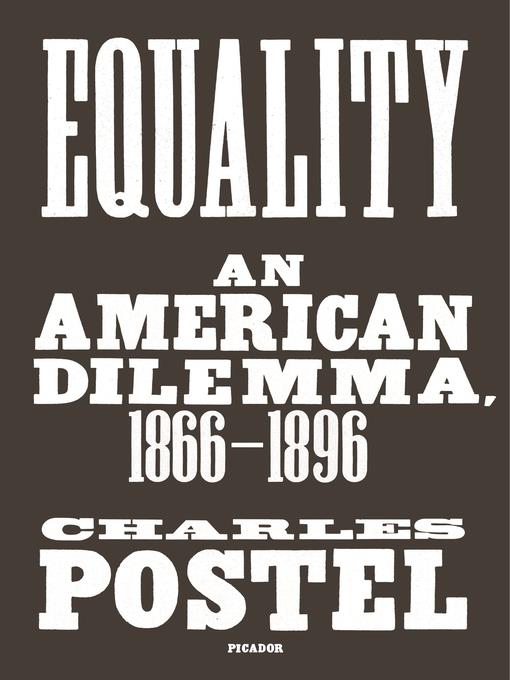
Equality
An American Dilemma, 1866-1896
کتاب های مرتبط
- اطلاعات
- نقد و بررسی
- دیدگاه کاربران
نقد و بررسی

May 15, 2019
A closely argued account of how various constituencies--women, farmers, African Americans, workers--vied for a place at the table in the reunited republic. As Bancroft Prize-winning historian Postel (San Francisco State Univ.; The Populist Vision, 2007) recounts, the Civil War brought newfound demands for equality in unexpected ways. At the beginning of the narrative, the author chronicles how logisticians responsible for burying the Union dead at Gettysburg struggled to devise a way to represent each contributing state equally, "a challenge given that more bodies came from some states than from others and given the sloping and uneven terrain of the grounds." Other interest groups would find the terrain even rougher. The Grange movement, for instance, sought to represent the interests of small farmers in a time of federal consolidation and the growth of great railroad and manufacturing corporations. The press of the agrarians for a Cabinet-level secretary of agriculture led to some uncomfortable accommodations, including making common cause with Southern farmers opposed to Reconstruction. As a result, African Americans were often excluded, though sometimes not, in influential visions of the postwar nation. The Grangers and radical labor movement alike saw their enemy as the "monopolists," a category that "included bankers, lawyers, grain elevator and cotton gin operators, insurance agents, grain and cotton purchasers, farm machinery dealers, and local merchants." The women's temperance movement took similar views: The enemy was not just alcohol, but also inequality, which yielded a movement to outlaw booze and, as well, grant women the right to vote, to say nothing of demanding equal pay for equal work. Postel has a keen eye for unlikely juxtapositions. For instance, as he writes, the leader of the hard-charging Knights of Labor became not just a close ally and protector of the radical activist Mother Jones, but also, and simultaneously, "an official in the federal bureaucracy enforcing the Chinese exclusion laws and other restrictive policies." Of much use in understanding the course of late-19th-century American history, a time of turmoil that resembles our own in many respects.
COPYRIGHT(2019) Kirkus Reviews, ALL RIGHTS RESERVED.

June 10, 2019
In an acute analysis, historian Postel (The Populist Vision) persuasively argues that three advocacy organizations which worked to achieve a more level socioeconomic level playing field in the decades following the Civil War advanced their causes at the expense of racial equality. Postel looks at the Grange (focused on the needs of farmers), the Women’s Christian Temperance Union (WCTU, focused on women), and the Knights of Labor (KOL, advocated for industrial workers) and notes that, for example, even though African-Americans comprised a majority of members in the KOL, Thomas Powderly, its longtime leader, declared in 1886 that, while black and white workers deserved “an equal share of protection,” his organization had “no wish to interfere with the social relations which exist between the races of the South.” His successor, James Sovereign, favored the deportation of African-Americans to Liberia or the Congo. The two other organizations took many progressive stances, with the Grange fighting railroad monopolies and the WCTU advocating for women’s suffrage and the eight-hour workday. But they, too, were willing to acquiesce to Jim Crow laws and customs. (The WCTU’s leader, Frances Willard, even defended lynch mobs as taking, in Postel’s words, “defensive actions against black sexual predators.”) With deep research and clear prose, Postel ably demonstrates that African-Americans were consistently excluded from these reformers’ visions of a more equal America. Postel’s broad and valuable study ably illuminates the era.

July 1, 2019
Postel (history, San Francisco State Univ.; The Populist Vision) offers a lucid and deeply researched investigation of three of the post-Civil War era's most powerful social reform movements and their charismatic leaders. The Grange, led by Oliver Kelley, fought for the rights of small farmers; the Women's Christian Temperance Union, presided over by Francis Willard, advocated for women's rights and child labor laws; and the Knights of Labor, directed by Terrence Powderly, held strikes to improve lives of workers. Postel is at his best when describing how all three movements struck devil's bargains with the white South that in return for its membership marginalized African Americans who were denied the social equality these movements promised. African Americans formed their own protective organizations, but they were overrun by Jim Crow laws, while the above reform groups fell victim to economic and political elites. Postel warns that the early 21st century echoes the inequality of the Reconstruction and Gilded Age years, and that mass collective activism is essential to fulfilling the American promise. VERDICT This scholarly account will appeal to informed readers, especially Reconstruction era historians.--Karl Helicher, formerly with Upper Merion Twp. Lib., King of Prussia, PA
Copyright 2019 Library Journal, LLC Used with permission.

























دیدگاه کاربران